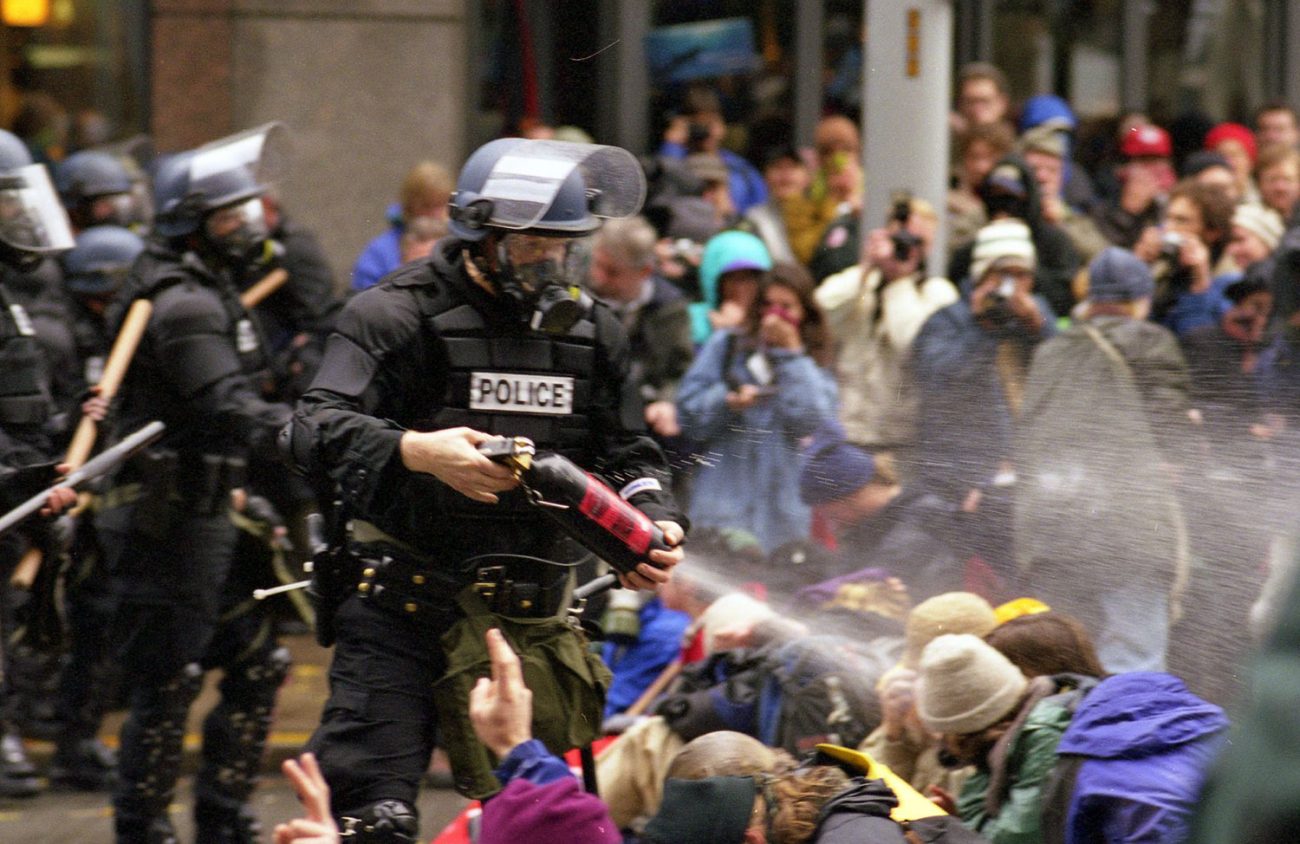On Nov. 30, 1999, Seattle hosted the third World Trade Organization Ministerial in Seattle. The summit brought leaders from more than 160 countries and drew as many as 2,000 press representatives and interest groups to the city.
It also attracted Eugene anarchists, who were blamed for much of the destruction that occurred, according to a 60 Minutes report and a statement from the chief of the Seattle Police Department.
Whiteaker Tales, a series of local conversations centered on historical moments of the Eugene neighborhood, is remembering the 1999 WTO summit protests Nov. 30, the 20th anniversary of the protests.
“It was a time when people really felt like they were alive and finally could fight against the system,” says Tim Lewis, a local filmmaker who shot footage at the protests and is the creator of Whiteaker Tales. “At that time,” he says, the system “was the WTO.”
Lewis’ documentary Breaking the Spell captures the streets of Seattle as they were overcome with protesters and rioters in 1999. In response, Seattle police launched tear gas canisters into the gathering crowds, shot rubber bullets at protesters, and clubbed and pepper sprayed demonstrators blocking intersections.
As global leaders planned free trade policies at the Seattle Convention Center, protesters spray-painted on the storefronts of corporations, leaving behind phrases such as “No sweat shops” outside of a GAP store and “Nazi Town” at what was then known as the Niketown store.
One street scene from the documentary shows protesters singing the national anthem as Seattle police demand they vacate the intersection. Immediately after the singing wraps up, police begin smacking protesters with batons and spraying them point-blank in the face with pepper spray.
Protesters were combating an institution and a meeting that, according to an email from then Seattle Mayor Paul Schell to city employees, could “influence how trade would be conducted for years to come.”
President Bill Clinton, responsible for the controversial North American Free Trade Agreement (NAFTA) in the 1990s, attended the Seattle summit. He denounced demonstrators who engaged in direct action against the summit, but he also criticized how the WTO operates in secrecy at the Port of Seattle.
The protests, known as the Battle in Seattle, had an impact on the WTO. An academic article by Morten Bøås and Jonas Vevatne titled “Sustainable Development and the WTO” says there aren’t many global organizations that follow neoliberalism more closely than the WTO.
The Seattle protesters, the authors write, gave delegates from Africa, the Caribbean and the Pacific the leverage to counter-pressure the more powerful countries. The protests also led the WTO to hold its next round in Doha, Qatar, a country with limited civil rights to protest.
Like other cities, Eugene did have its own contingent of anarchists at the WTO protests, but Lewis says the police and the powers-that-be had to focus on someone.
It’s likely that Eugene drew attention because of local riots that happened June 18, 1999, he says. Occurring alongside a global action day against capitalism called “Carnival Against Capital,” people engaged in marches and property destruction throughout Eugene.
“The police came into Washington-Jefferson Park and tear gassed,” Lewis says, adding that the protesters then pushed the police out of the park, resulting in arrests. “There was a lot of attention directed toward Eugene about that,” he adds.
Media outlets parachuted into Eugene to learn more about the people who were ostensibly responsible for the destruction and mayhem in Seattle after the WTO. Reporters from the L.A. Times, New York Times, Rolling Stone, Spin, 60 Minutes, Dateline and other outlets came to the region to report.
Lewis says what happened in Seattle also inspired action in Europe. After the protests, where direct action and property destruction stalled the WTO’s Seattle summit, the anti-globalization movement really kicked off. For instance, at a bookstore in Chiapas, Mexico, home of the Zapatista movement, an entire section was dedicated to literature about activism in Seattle and the WTO protests.
The anti-globalization movement grew until Sept. 11, 2001, Lewis says. That’s because after the terrorist attacks, U.S. politicians reacted with the Patriot Act.
“People were pulling out of any kind of movement or direction action, and the police were clamping down more and more,” Lewis says.
He adds that masses of people are rising up again, but instead of taking on free trade, people are resisting fascism.
Lewis’ one-hour documentary, Breaking the Spell, available streaming online, covers the protests and the media aftermath. The Whiteaker Tales’ WTO event, however, will show RIP WTO N30, a 30-minute documentary by Lewis and attorney Tim Ream, who will host the Nov. 30 event.
The WTO protests are a time that Lewis says people will remember as a historical moment for the rest of their lives. He says the point of Whiteaker Tales is to have a community dialogue about what went wrong and right, as well as providing a chance for the younger generation to ask questions. It’s a way to keep stories alive.
The Nov. 30 event offers a place for those who took part in the protests to grab a drink and get into some arguments. It’ll be like old times, Lewis says. ν
Whiteaker Tales is 6 pm Saturday, Nov. 30, at Sam Bond’s Garage, 407 Blair Boulevard. Entry is free.
